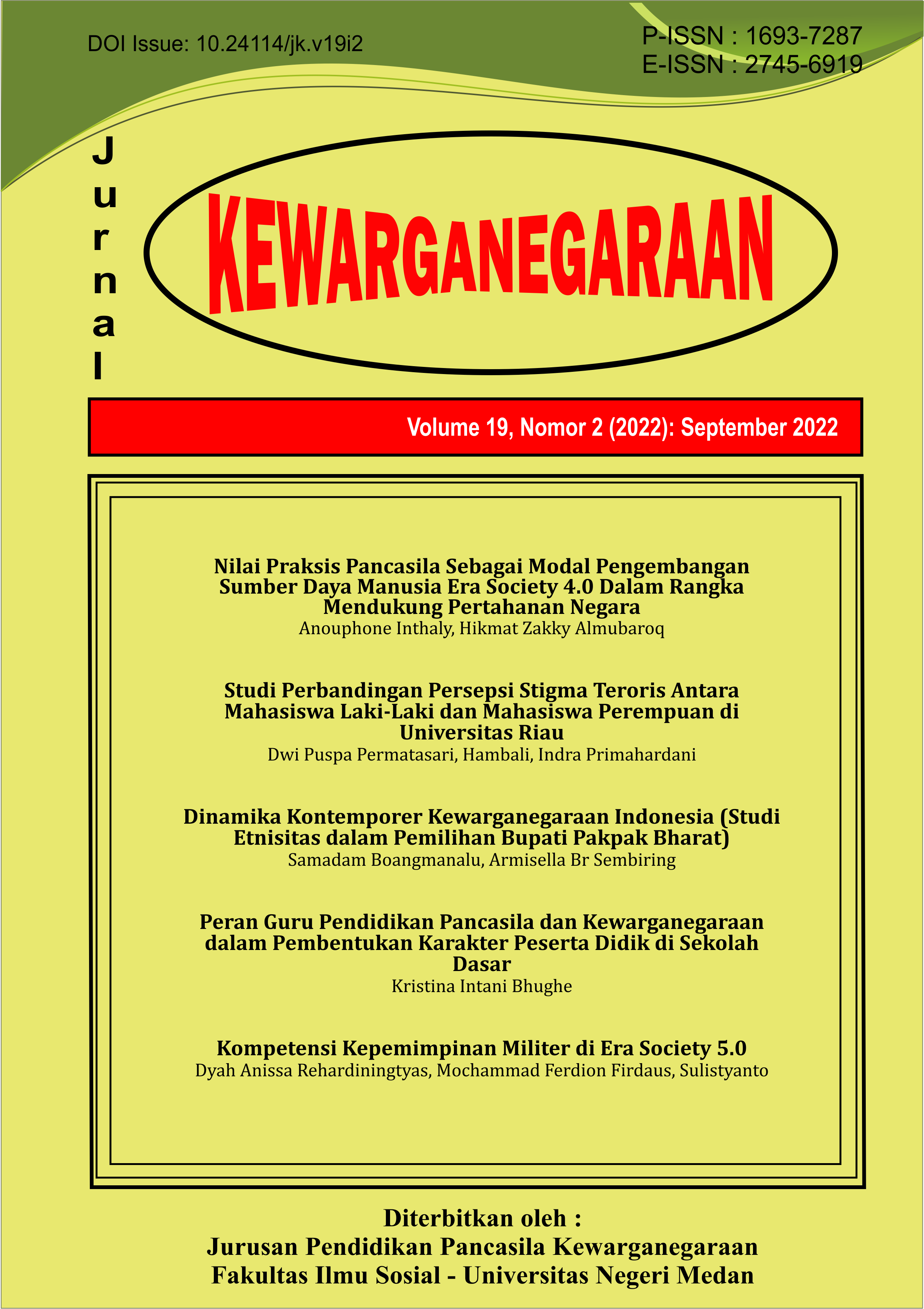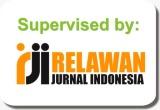Kompetensi Kepemimpinan Militer di Era Society 5.0
DOI:
https://doi.org/10.24114/jk.v19i2.35229Keywords:
leadership, society 5.0, leadership strategy, kepemimpinan, kompetensi kepemimpinanAbstract
AbstractThe 21st-century environment is one of unprecedented complexity, ambiguity, speed and organizational change. Conceptual skills provide the capacity to perform effectively under these conditions. Leadership in military organizations in various countries has the same goal, namely to realize the vision and mission of the organization according to its duties, authorities and responsibilities based on the results of state political decisions. This article was compiled based on a literature study using a descriptive qualitative approach as the main writing approach. Leaders are faced with an environment that is constantly changing, complex, and challenging. To lead effectively in today's world, leaders need to improve their understanding and practice of leadership to meet the new challenges coming from all directions with rapid change. Military leaders from top to bottom must be able to deal with the increasing political and cultural complexities. In the era of society 5.0, supervision does not only belong to the Leader but is also carried out by all members of the organization. The ease of technology as well as the challenges of good governance make transparency and openness an instrument. The development of the industrial era is a challenge in itself, as such policymakers inevitably have to be able to prepare themselves to face increasingly complex challenges, internal security and disaster management.-----------AbstrakLingkungan abad ke-21 adalah salah satu dari kompleksitas, ambiguitas, kecepatan, dan perubahan organisasi yang belum pernah terjadi sebelumnya. Keterampilan konseptual memberikan kapasitas untuk tampil efektif dalam kondisi ini. Kepemimpinan di Organisasi militer di berbagai negara memiliki tujuan yang sama yaitu untuk mewujudkan visi dan misi organisasi sesuai tugas, wewenang dan tanggung jawabnya berdasar hasil keputusan politik negara. Artikel ini disusun berdasarkan studi literatur dengan menggunakan pendekatan kualitatif deskriptif sebagai pendekatan penulisan utama. Para pemimpin dihadapkan pada lingkungan yang terus berubah, kompleks, dan menantang. Untuk dapat memimpin secara efektif di dunia saat ini, pemimpin perlu meningkatkan pemahaman dan praktek kepemimpinan mereka untuk memenuhi tantangan baru yang menghadang dari segala arah dengan perubahan yang sangat cepat. Pemimpin Militer dari atas ke bawah harus mampu menghadapi peningkatan kompleksitas politik dan budaya dari perang proxy, operasi perdamaian, kehadiran dan keterlibatan ke depan, keamanan internal dan manajemen bencana. Di era masyarakat 5.0, pengawasan bukan hanya menjadi milik Pemimpin namun juga dilakukan oleh seluruh anggota organisasi. Kemudahan teknologi dan juga tantangan good governance menjadikan transparansi dan keterbukaan menjadi instrumen. Perkembangan era industri menjadi tantangan tersendiri, sebagaimana hal tersebut para pengambil kebijakan mau tidak mau harus mampu menyiapkan diri dalam menghadapi tantangan yang semakin kompleksReferences
Ainsworth, E. A., & Rogers, A. (2007). The Response of Photosynthesis and Stomatal Conductance to Rising [CO2]: Mechanisms and Environmental Interactions. Plant, Cell & Environment, 30(3), 258“270. https://doi.org/10.1111/J.1365-3040.2007.01641.X
Alawiyah, D., Rahmat, H. K., & Pernanda, S. (2020). Menemukenali Konsep Etika Dan Sikap Konselor Profesional dalam Bimbingan dan Konseling. Jurnal Mimbar: Media Intelektual Muslim dan Bimbingan Rohani, 6(2), 84“101. https://doi.org/10.47435/MIMBAR.V6I2.457
Alhudawi, U., Simatupang, E., & Rachman, F. (2021). Membangun Kesadaran Bela Negara Masyarakat Pedesaan Berbasis Nilai Kearifan Lokal. Jurnal Muara Ilmu Sosial, Humaniora, dan Seni, 5(2), 529“538. https://doi.org/10.24912/jmishumsen.v5i2.10156.2021
Basuki, J. (2021). Tantangan Ilmu Administrasi Publik: Paradigma Baru Kepemimpinan Aparatur Negara. Public Inspiration: Jurnal Administrasi Publik, 6(2), 160“181. https://doi.org/10.22225/pi.6.2.2021.160-181
Cohen, D. K. (1980). Minimum Competency Achievement Testing: Motives, Models, Measures, and Consequences (R. M. Jaeger & C. Kehr, ed.). Berkeley, CA: McCutchan Publishing Company.
Damayanti, F. P., & Mirfani, A. M. (2021). An Analysis of Digital Leadership in the Pandemic Covid-19 Era. Proceedings of the 4th International Conference on Research of Educational Administration and Management (ICREAM 2020), 526, 156“159. https://doi.org/10.2991/assehr.k.210212.033
Ellitan, L. (2020). Competing in the Era of Industrial Revolution 4.0 and Society 5.0. Jurnal Maksipreneur: Manajemen, Koperasi, dan Entrepreneurship, 10(1), 1“12. https://doi.org/10.30588/JMP.V10I1.657
Faruqi, U. Al. (2019). Future Service in Industry 5.0. Jurnal Sistem Cerdas, 2(1), 67“79. https://doi.org/10.37396/jsc.v2i1.21
Fatayat, R. (2021). Kepemimpinan Spiritual di Perpustakaan untuk Menghadapi Era Society 5.0. Jurnal Imam Bonjol: Kajian Ilmu Informasi dan Perpustakaan, 5(2), 104“110. https://doi.org/10.15548/jib.v5i2.116
Galvin, T. (2018). Leading Change in Military Organizations: Primer for Senior Leaders (1 ed.). Carlisle, PA: U.S. Army War College.
Luthan, F. (2006). Perilaku Organisasi (10 ed.). Yogyakarta: ANDI.
Mallick, P. K. (2020). Military Leadership-The Changing Paradigm.
Marisa, M., & Nur, S. A. (2021). Kepemimpinan Transformasional Pendidikan Di Era Society 5.0. SOSIOEDUKASI : JURNAL ILMIAH ILMU PENDIDIKAN DAN SOSIAL, 10(2), 257“270. https://doi.org/10.36526/SOSIOEDUKASI.V10I2.1553
Nadeak, B. (2019). Manajemen Sumber Daya Manusia Pendidikan Era Industri 4.0. Jakarta: UKI Press.
Parjaman, T., Soedarmo, U. R., & Enas. (2019). Penguatan Kapasitas Aparatur Untuk Meningkatkan Daya Saing Daerah Di Era Global. Journal of Management Review, 3(3), 29“42. https://doi.org/10.25157/mr.v3i3.2869
Peraturan Presiden Republik Indonesia Nomor 8 Tahun 2021 tentang Kebijakan Umum Pertahanan Negara.
Pereira, A. G., Lima, T. M., & Santos, F. C. (2020). Industry 4.0 and Society 5.0: Opportunities and Threats. International Journal of Recent Technology and Engineering (IJRTE), 8(5), 3305“3308. https://doi.org/10.35940/ijrte.D8764.018520
Pettigrew, A. M. (2012). Context and Action in the Transformation of the Firm: A Reprise. Journal of Management Studies, 49(7), 1304“1328. https://doi.org/10.1111/J.1467-6486.2012.01054.X
Pratama, F. F., & Mutia, D. (2020). Paradigma Kualitatif sebagai Landasan Berpikir Pendidikan Kewarganegaraan. Jurnal Kewarganegaraan, 17(1), 51“64. https://doi.org/10.24114/jk.v17i1.18701
Putra Bagus Kurniawan Sekolah Tinggi Filsafat Teologi Widya Sasana, I., & Timur, J. (2022). Pergeseran Partisipasi Sosial (Masyarakat) dalam Masa Pandemi COVID-19 (Tinjauan Fenomenologis Individu Selama Pandemi COVID-19). Jurnal Kewarganegaraan, 19(1), 16“32. https://doi.org/10.24114/JK.V19I1.29453
Rahmat, H. K., & Alawiyah, D. (2020). Konseling Traumatik: Sebuah Strategi Guna Mereduksi Dampak Psikologis Korban Bencana Alam. Jurnal Mimbar: Media Intelektual Muslim dan Bimbingan Rohani, 6(1), 34“44. https://doi.org/10.47435/MIMBAR.V6I1.372
Rahmat, H. K., Basri, A. S. H., Putra, R. M., Mulkiyan, M., Wahyuni, S. W., & Casmini, C. (2022). The Influenced Factors of Spiritual Well-Being: a Systematic Review. Sociocouns: Journal of Islamic Guidance and Counseling, 2(1), 43“58. https://doi.org/10.35719/sjigc.v2i1.23
Rahmat, H. K., Ramadhani, R. M., Ma™rufah, N., Gustaman, F. A. I., Sumantri, S. H., & Adriyanto, A. (2020). Bantuan China Berupa Alat Uji Cepat COVID-19 kepada Filipina: Perspektif Diplomacy and International Lobbying Theory. Jurnal Pendidikan Ilmu Sosial, 30(1), 19“27. https://doi.org/10.23917/JPIS.V30I1.10623
Rustandi, R. (2019). Cyberdakwah: Internet Sebagai Media Baru Dalam Sistem Komunikasi Dakwah Islam. NALAR: Jurnal Peradaban dan Pemikiran Islam, 3(2), 84“95. https://doi.org/10.23971/NJPPI.V3I2.1678
Sá, M. J., Santos, A. I., Serpa, S., & Ferreira, C. M. (2021). Digital Literacy in Digital Society 5.0: Some Challenges. Academic Journal of Interdisciplinary Studies, 10(2), 1. https://doi.org/10.36941/ajis-2021-0033
Soemanagara, S. (2003). Kepemimpinan Militer: Sejarah Singkat, Nilai, Prinsip dan Ciri Khas. Jurnal Manajemen dan Sistem Informasi, 2(2). https://doi.org/10.17509/manajerial.v2i2.16465
Subarsono, A. G. (2012). Analisis Kebijakan Publik: Konsep, Teori dan Aplikasi. Yogyakarta: Pustaka Pelajar.
Suherman, Musnaini, Wijoyo, H., & Indrawan, I. (2020). Industry 4.0 vs Society 5.0. Banyumas: Pena Persada.
Sukoco, B. M. (2007). Manajemen Administrasi Perkantoran Modern. Jakarta: Erlangga.
Terry, G. R. (2012). Asas-Asas Manajemen (8 ed.; Winardi, penerj.). Bandung: PT Alumni.
Thoha, M. (2017). Ilmu Administrasi Publik Kontemporer. Jakarta: Kencana.
Timpe, A. D. (2002). Seri Manajemen Sumber Daya Manusia Kinerja. Jakarta: Elex Media Komputindo.
Winardi, J., Nurkolis, N., & Yuliejantiningsih, Y. (2017). Pengaruh Kepemimpinan Kepala Sekolah Dan Kompetensi Profesional Guru terhadap Sekolah Efektif pada SMP Negeri Rayon Patebon Kabupaten Kendal. Jurnal Manajemen Pendidikan (JMP), 6(2), 158“175. https://doi.org/10.26877/JMP.V6I2.1996
Downloads
Published
Issue
Section
License
Copyright (c) 2022 Dyah Anissa Rehardiningtyas, Mochammad Ferdion Firdaus, Sulistyanto Sulistyanto

This work is licensed under a Creative Commons Attribution-ShareAlike 4.0 International License.
Authors published with the Jurnal Kewarganegaraan agree to the following terms:
- Authors retain copyright and grant the journal the right of first publication with the work simultaneously licensed under a Creative Commons Attribution License (CC BY-SA 4.0) that allows others to share the work with an acknowledgment of the work's authorship and initial publication in this journal.
- Authors are able to enter into separate, additional contractual arrangements for the non-exclusive distribution of the journal's published version of the work (e.g., post it to an institutional repository or publish it in a book), with an acknowledgment of its initial publication in this journal.
- Authors are permitted and encouraged to post their work online (e.g., in institutional repositories or on their website) prior to and during the submission process, as it can lead to productive exchanges, as well as earlier and greater citation of published work. (See The Effect of Open Access)
Licence

Jurnal Kewarganegaraan is licensed under a Creative Commons Attribution-ShareAlike 4.0 International License.








